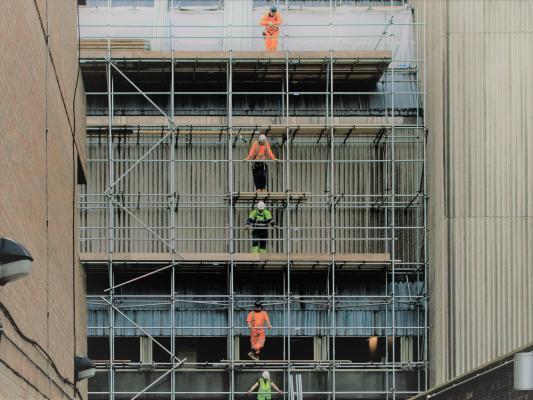Being a scaffolder requires a high level of skill, fitness and logical mindset, yet it’s a career that is sometimes overshadowed by the building or engineering work that it is supporting - the phrase, “always the bridesmaid never the bride” comes to mind!
But when you become a Scaffolder, you notice the problem solving that goes into these resilient towers - they're not just grown-up climbing frames (although they can be fun!). Elliott McGrath at Royston Scaffolding Ltd, regards scaffolding almost as an artform or sometimes like the tough bodyguard to the a-list building.
So with scaffolding becoming a more popular career option, here are some of the traits and benefits you’ll find with being a Scaffolder:
Pay
While the initial barrier to entry into becoming a scaffolder is relatively low, becoming a skilled scaffolder can take time and commitment, but with the National Career Service claiming the average salary of an experienced scaffolder is £40,000 per year, it can also be a rewarding career option.
Key Skills
Being a Scaffolder is demanding. It’s a high-risk industry and the key to success is showing respect to the Health & Safety rules, your colleagues and the customer at all times.
A head for heights
A love of the outdoors
Physically fit
A team player
A good listener to instructions
Unflustered by enclosed and tight spaces
As a Scaffolder it is essential you are able to work as part of a team and as with all careers being polite, reliable, honest and punctual is essential.
Training & Requirements
There are no formal qualifications required to be a Trainee Scaffolder, however you must have the ability to pass the Health, Safety & Environment Specialist Work at Height Test as soon as your Trainee Scaffolding journey begins and a commitment of continuous study to gain and update your Part 2 Scaffolding qualification. Some scaffolding towers are simple but some are complex engineering works of art - And, those scaffolders who study and train, as well as build up their experience are often the most in demand. If you love problem solving, engineering and enjoyed playing Lego or K’Nex as a child then you’re halfway there!
The Construction Industry Scaffolders Record Scheme, also referred to as CISRS, is the industry recognised training scheme for scaffolders and has been in place for over 40 years. CISRS offers training for a range of abilities and experience levels, from scaffold labourers and trainees to advanced scaffolders and inspectors.
Apprenticeships
Apprenticeships are available to those aged 16 and over who are not already in full time education. While they are often a popular route for school leavers, apprenticeships are not age restricted. In fact, almost half (47.2%) of the apprenticeships started in 2020/21 were by people aged 25 and over.
A scaffolding apprenticeship can offer valuable hands-on experience along with continuous learning of the trade. By the end of a scaffolding apprenticeship, an apprentice will have learnt all the skills and knowledge they will need to work in the scaffolding industry.
More positives
It can’t be underestimated that the Scaffolding industry is a physically and also mentally demanding area of work. However there are lots of positives that also come with the job. Working outside is one of the great benefits, but also visiting new places, working on incredible buildings, the camaraderie and seeing some of the best views with a vantage point few get to enjoy.
To find out more about career opportunities in Scaffolding see our full blog post: “Careers in Scaffolding: How to become a professional Scaffolder”.
